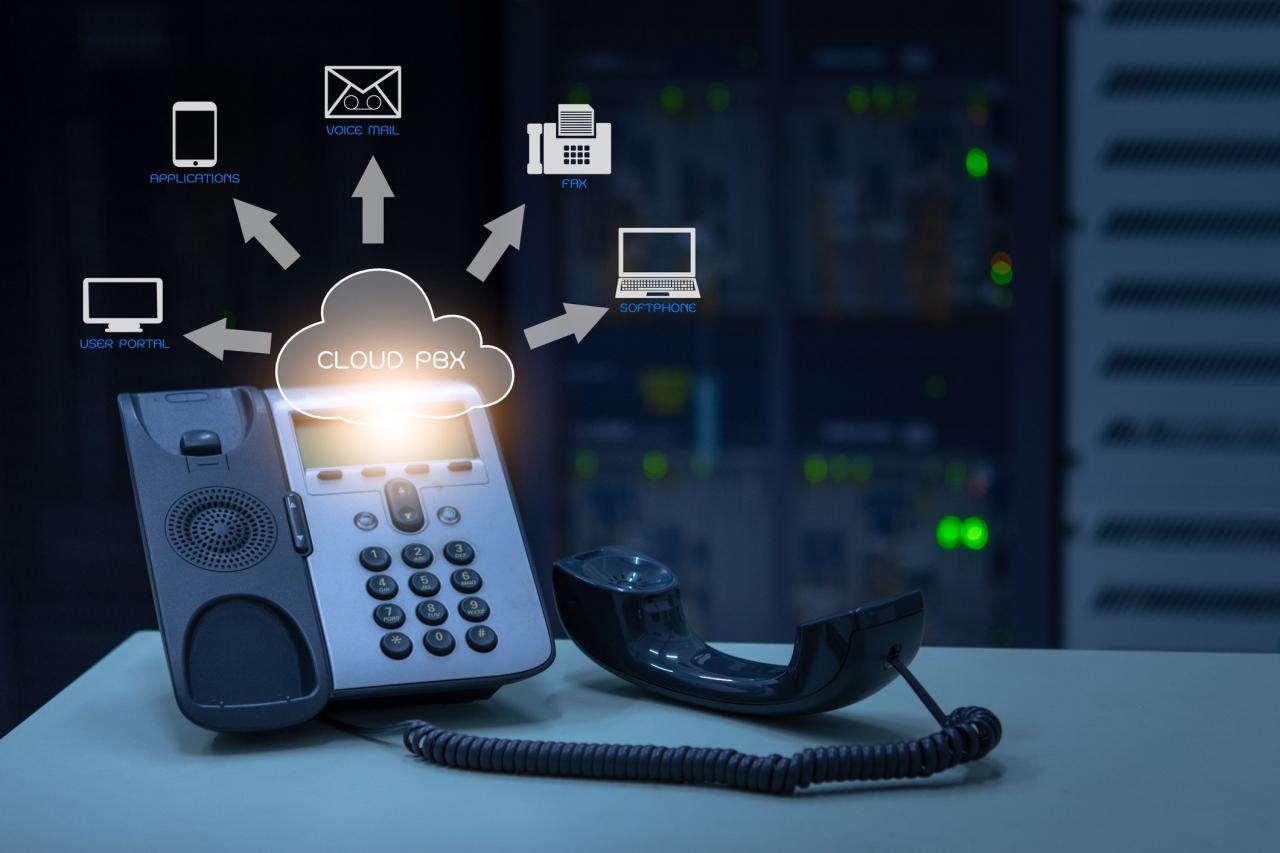Cloud phone systems are revolutionizing the way businesses communicate, offering a plethora of benefits that enhance productivity, efficiency, and customer satisfaction. These cutting-edge systems leverage the power of the cloud to provide a robust and flexible communication solution tailored to the needs of modern organizations.
Cloud phone systems come in various types, each with its own unique set of features and capabilities. From basic call forwarding to advanced unified communications, there’s a cloud phone system to suit every business need and budget.
Overview of Cloud Phone Systems
Cloud phone systems are a type of telecommunications service that uses the internet to connect users with their phone lines. This means that businesses can have their phone systems hosted in the cloud, rather than having to maintain their own on-premises equipment.
There are many benefits to using cloud phone systems, including:
- Cost savings:Cloud phone systems can be more cost-effective than traditional phone systems, as businesses do not have to purchase and maintain their own equipment.
- Scalability:Cloud phone systems can be easily scaled up or down to meet the changing needs of a business.
- Reliability:Cloud phone systems are typically more reliable than traditional phone systems, as they are not subject to power outages or other disruptions.
- Features:Cloud phone systems offer a wide range of features, such as call forwarding, voicemail, and auto-attendant.
There are different types of cloud phone systems available, including:
- Hosted PBX:Hosted PBX systems are a type of cloud phone system that is hosted by a third-party provider. This means that businesses do not have to purchase and maintain their own equipment.
- Virtual PBX:Virtual PBX systems are a type of cloud phone system that is hosted on a virtual server. This means that businesses can have their phone systems hosted in the cloud without having to purchase and maintain their own equipment.
- SIP trunking:SIP trunking is a type of cloud phone system that uses Session Initiation Protocol (SIP) to connect businesses to their phone lines. This means that businesses can use their existing IP network to connect to their phone lines.
Features of Cloud Phone Systems

Cloud phone systems offer a range of features that can enhance business communication and productivity. These features include:
- Call forwarding:Allows users to forward incoming calls to another number, such as a mobile phone or another extension.
- Voicemail:Provides a way for callers to leave messages when the user is unavailable.
- Auto-attendant:A virtual receptionist that greets callers and directs them to the appropriate extension or department.
- Conference calling:Allows multiple users to participate in a single call.
- Call recording:Records phone calls for training, quality control, or legal purposes.
These features can be used to improve customer service, increase productivity, and reduce costs. For example, call forwarding can be used to ensure that customers always reach the right person, even if the user is out of the office. Voicemail can be used to capture messages from customers who call outside of business hours.
Auto-attendants can be used to direct callers to the appropriate department or extension, reducing the need for manual call handling.
Advantages and Disadvantages of Different Features
The advantages and disadvantages of different cloud phone system features vary depending on the specific needs of the business. For example, call forwarding can be a useful feature for businesses that need to ensure that customers always reach the right person, but it can also be a disadvantage if it is not properly managed, as it can lead to missed calls.
Voicemail can be a useful feature for businesses that need to capture messages from customers who call outside of business hours, but it can also be a disadvantage if it is not properly managed, as it can lead to voicemail overload.
Auto-attendants can be a useful feature for businesses that need to direct callers to the appropriate department or extension, but it can also be a disadvantage if it is not properly managed, as it can lead to callers being directed to the wrong place.
Benefits of Cloud Phone Systems
Cloud phone systems offer numerous advantages that can enhance business communication and streamline operations. They provide a range of benefits that traditional phone systems cannot match, including cost savings, flexibility, and improved customer service.
One of the key benefits of cloud phone systems is their cost-effectiveness. They eliminate the need for expensive hardware and maintenance costs associated with traditional phone systems. Cloud phone systems are also highly scalable, allowing businesses to easily add or remove users as needed without incurring additional infrastructure costs.
Flexibility and Remote Work
Cloud phone systems offer unparalleled flexibility, enabling employees to work from anywhere with an internet connection. This flexibility is particularly beneficial for businesses with remote or hybrid workforces. Cloud phone systems also allow for easy integration with other business applications, such as CRM and ERP systems, enhancing productivity and streamlining workflows.
Improved Customer Service
Cloud phone systems provide a range of features that can significantly improve customer service. These features include call routing, voicemail-to-email transcription, and automated call distribution. Cloud phone systems also enable businesses to track and analyze call data, providing valuable insights into customer interactions and areas for improvement.
Case Studies
- Company A:A large healthcare provider implemented a cloud phone system and reduced its telecommunications costs by 30%. The system also improved customer satisfaction by providing faster call resolution times.
- Company B:A technology startup used a cloud phone system to enable its remote workforce to collaborate seamlessly. The system’s flexibility allowed the company to scale its operations quickly and efficiently.
Considerations for Choosing a Cloud Phone System
Choosing the right cloud phone system for your business requires careful consideration of several key factors. These factors include scalability, reliability, security, and feature set.
Scalability
When choosing a cloud phone system, it’s essential to consider your business’s current and future needs. If your business is growing rapidly, you’ll need a system that can scale easily to accommodate your expanding workforce.
Reliability
The reliability of a cloud phone system is crucial for businesses that rely heavily on phone communication. Look for a system with a proven track record of uptime and reliability.
Security
Security is another important consideration when choosing a cloud phone system. Ensure that the system you choose meets your security requirements and protects your sensitive data from unauthorized access.
Feature Set
The feature set of a cloud phone system is also an important consideration. Make sure the system you choose offers the features you need, such as call forwarding, voicemail, auto-attendant, and video conferencing.
Implementation of Cloud Phone Systems
Implementing a cloud phone system involves careful planning and execution. Here are the key steps:
- Planning and Assessment:Determine your business needs, conduct a cost-benefit analysis, and choose a cloud phone system provider.
- Procurement and Setup:Purchase the necessary hardware and software, and configure the system according to your requirements.
- Data Migration:Transfer your existing phone numbers and data to the cloud phone system.
- User Training:Provide training to employees on how to use the new system’s features and functionality.
- Deployment and Go-Live:Roll out the cloud phone system to your users and ensure a smooth transition.
Timeline and Checklist
The implementation timeline will vary depending on the size and complexity of your organization. However, a typical timeline might look like this:
- Week 1:Planning and assessment
- Week 2:Procurement and setup
- Week 3:Data migration
- Week 4:User training
- Week 5:Deployment and go-live
Challenges and Solutions, Cloud phone system
During implementation, you may encounter challenges such as:
- Data migration issues:Ensure you have a comprehensive data backup and migration plan in place.
- User resistance:Provide clear communication and training to help users adapt to the new system.
- Network connectivity problems:Test your network thoroughly and have a backup plan in case of outages.
Overcoming these challenges requires careful planning, effective communication, and a dedicated implementation team. By addressing these issues proactively, you can ensure a successful implementation of your cloud phone system.
Security of Cloud Phone Systems
Cloud phone system providers implement robust security measures to protect user data and communications. These measures include:
- Encryption of data at rest and in transit
- Multi-factor authentication for user access
- Regular security audits and penetration testing
- Compliance with industry-standard security protocols
Compliance Requirements
Cloud phone systems must comply with various industry regulations and standards, including:
- HIPAA (Health Insurance Portability and Accountability Act)
- PCI DSS (Payment Card Industry Data Security Standard)
- SOC 2 (Service Organization Control 2)
These regulations mandate specific security controls to protect sensitive data, such as patient information, financial data, and personal identifiable information (PII).
Best Practices
To ensure the security of cloud phone systems, organizations should follow best practices such as:
- Regularly updating software and firmware
- Implementing strong password policies
- Restricting access to sensitive data on a need-to-know basis
- Monitoring system logs for suspicious activity
By adhering to these security measures, compliance requirements, and best practices, organizations can ensure the confidentiality, integrity, and availability of their cloud phone systems.
Trends and Future of Cloud Phone Systems

Cloud phone systems are constantly evolving, with new features and capabilities being added all the time. Some of the latest trends in cloud phone system technology include:
- Artificial intelligence (AI): AI is being used to power a variety of features in cloud phone systems, such as call routing, voicemail transcription, and customer service chatbots.
- Unified communications: Cloud phone systems are increasingly being integrated with other business applications, such as CRM and ERP systems, to provide a more unified communications experience.
- Mobility: Cloud phone systems are becoming more mobile-friendly, with features such as mobile apps and softphones that allow users to make and receive calls from anywhere.
The future of cloud phone systems is bright. As technology continues to evolve, we can expect to see even more innovative features and capabilities added to these systems. Cloud phone systems will continue to play a vital role in business communications, providing businesses with a flexible, scalable, and cost-effective way to connect with their customers and employees.
Impact of Artificial Intelligence on Cloud Phone Systems
AI is having a major impact on cloud phone systems. AI-powered features can help businesses to improve their customer service, increase their efficiency, and reduce their costs.
- Improved customer service: AI can be used to power chatbots that can answer customer questions and resolve issues quickly and efficiently.
- Increased efficiency: AI can be used to automate tasks such as call routing and voicemail transcription, freeing up employees to focus on more important tasks.
- Reduced costs: AI can help businesses to reduce their costs by automating tasks and improving efficiency.
As AI continues to develop, we can expect to see even more innovative AI-powered features added to cloud phone systems. AI will play a major role in the future of cloud phone systems, helping businesses to improve their communications and operations.
Final Conclusion
As the future of business communication unfolds, cloud phone systems will continue to evolve and integrate with emerging technologies like artificial intelligence and machine learning. These advancements will further enhance the capabilities of cloud phone systems, making them even more indispensable for businesses looking to stay competitive in the digital age.
Originally posted 2024-05-17 17:35:30.
 Bussines News Daily
Bussines News Daily



